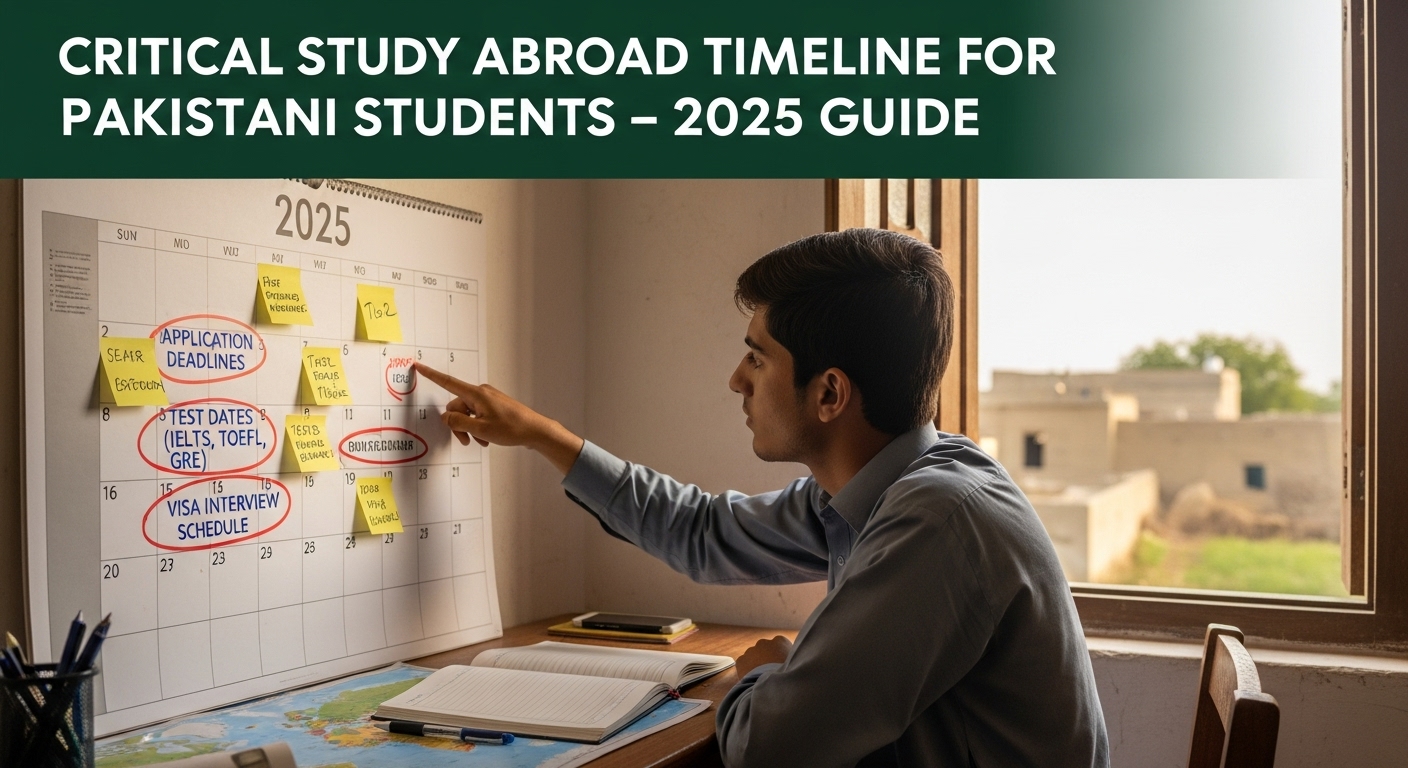Studying abroad is a transformative journey, opening doors to world-class education, diverse cultures, and unparalleled career opportunities. For Pakistani students, this dream is becoming increasingly accessible. However, navigating the complex process can feel overwhelming, especially when you’re starting from scratch.
This comprehensive guide is designed to be your trusted companion, breaking down every step of the study abroad timeline for Pakistani students in 2025. We’ll cover everything from your initial thoughts to your final preparations, ensuring you feel confident and prepared at every turn. Let’s embark on this exciting adventure together!
Phase 1: The Initial Spark – (12-18 Months Before Desired Intake)
This is where your dream takes shape. It’s about exploring possibilities, understanding your goals, and getting a realistic picture of what’s involved. Don’t rush this stage; thorough research now will save you countless headaches later.
Step 1: Self-Assessment and Goal Setting
- Reflect on your academic strengths and interests: Which subjects do you excel at? What topics genuinely excite you?
- Consider your career goals: What kind of job do you envision yourself in after graduation? Does a particular country or field of study align better with that goal?
- Evaluate your financial situation: How much can your family realistically contribute? Are you reliant on scholarships? This will significantly influence your choice of country and university.
- Think about your personal preferences: Do you prefer a bustling city or a quiet town? A cold climate or a warm one? These factors contribute to your overall well-being and success abroad.
- Research various fields of study: Explore degree programs that align with your interests. Look at their curriculum, faculty, and career outcomes.
Common Mistake: Rushing into choosing a country or program based on friends’ choices or popular trends without considering personal fit. This can lead to dissatisfaction later.
Tip for Pakistanis: Discuss your aspirations openly with your family. Their support, both emotional and financial, is crucial for your study abroad journey.
Step 2: Initial Research – Destinations and Programs
- Explore popular study destinations: Consider countries like the USA, UK, Canada, Australia, Germany, Malaysia, and Turkey. Each offers unique advantages in terms of cost, visa ease, and post-study opportunities.
- Look into specific universities and their programs: Don’t just pick a country; delve into the universities within that country. Check their rankings, program details, faculty profiles, and student testimonials.
- Understand admission requirements: These vary significantly by country and university. Pay attention to academic prerequisites, English language proficiency (IELTS/TOEFL scores), and any standardized test requirements (SAT, GRE, GMAT).
- Research scholarship opportunities: Many universities and governments offer scholarships for international students. Start identifying these early, as deadlines can be much earlier than admission deadlines.
- Consult reputable education consultants: Many Pakistani students benefit from the expertise of local education consultants. They can provide tailored advice and help you navigate the vast information.
Common Mistake: Focusing solely on top-ranked universities, which might have highly competitive admissions and higher tuition fees, without exploring equally good but more accessible options.
Tip for Pakistanis: Many foreign university representatives visit Pakistan for education fairs. Attending these events can provide valuable direct interaction and information. Keep an eye out for “Study Abroad Expos” in major cities like Lahore, Karachi, and Islamabad.
Step 3: Financial Planning and Scholarship Search
- Estimate total costs: Research average tuition fees for your chosen programs and estimated living expenses in your target cities. Remember to factor in visa application fees, flight tickets, and health insurance.
- Identify funding sources: This could be personal savings, family contributions, educational loans, or scholarships.
- Research scholarship databases: Look for scholarships offered by universities, government programs (like Fulbright for the USA, Chevening for the UK, DAAD for Germany, MEXT for Japan), and private organizations.
- Check scholarship eligibility criteria: Most scholarships have specific academic requirements, essays, or other conditions. Start preparing for these well in advance.
- Understand the financial proof required for visas: Most countries require you to demonstrate that you have sufficient funds to cover your tuition and living expenses for at least the first year. This usually involves bank statements.
Common Mistake: Underestimating total expenses, or waiting too late to apply for scholarships. Many full scholarships are highly competitive and have early application windows.
Tip for Pakistanis: Explore local banks for education loan options, and understand their collateral and repayment terms. Also, look into government-backed loan schemes if available.
Phase 2: The Application Sprint – (6-12 Months Before Desired Intake)
With your destination and program in mind, this phase is all about preparing and submitting a strong application.
Step 4: English Language Proficiency Tests (IELTS/TOEFL)
- Choose your test: IELTS and TOEFL are the most widely accepted. Check your target university’s specific requirements.
- Register early: Test slots, especially in major cities like Lahore, Karachi, and Islamabad, fill up quickly. Register several months in advance.
- Prepare thoroughly: Utilize online resources, practice tests, and consider joining an English language test preparation academy. Focus on all four modules: Reading, Writing, Listening, and Speaking.
- Aim for a high score: While universities have minimum requirements, a higher score can strengthen your application and potentially make you eligible for more scholarships.
- Retake if necessary: If your first score isn’t satisfactory, don’t hesitate to retake the test after further preparation.
Common Mistake: Underestimating the difficulty of these tests or leaving preparation until the last minute. This can lead to low scores and delays in your application.
Tip for Pakistanis: Many local institutes offer excellent IELTS and TOEFL preparation courses. Look for those with experienced instructors and good track records. Also, practice speaking English regularly to improve fluency.
Step 5: Standardized Tests (SAT/GRE/GMAT – if required)
- Confirm requirements: Not all universities or programs require these tests. Double-check before investing time and money.
- Understand the test format: Each test has a specific structure and scoring system.
- Begin preparation early: These tests require significant time for preparation. Use official study materials and practice tests.
- Register for the test: Like English language tests, registration should be done well in advance.
Common Mistake: Assuming these tests are always required, or not dedicating enough time to preparation if they are.
Tip for Pakistanis: There are various coaching centers in Pakistan that specialize in SAT, GRE, and GMAT preparation. Consider joining one for structured learning and practice.
Step 6: Document Collection and Attestation
- Academic Transcripts/Mark Sheets: Gather all your academic records from Matric, Intermediate, and university degrees. Ensure they are officially stamped and signed by your institution.
- Degree Certificates: Obtain original degree certificates.
- Attestation:
- For Matric/Intermediate documents: Get them attested by the Inter Board Committee of Chairmen (IBCC). This is mandatory for using Pakistani academic documents abroad.
- For Bachelor’s/Master’s degrees: Get them attested by the Higher Education Commission (HEC) of Pakistan.
- After IBCC/HEC attestation, all educational documents, along with your passport copy, should also be attested by the Ministry of Foreign Affairs (MOFA) of Pakistan.
- Passport: Ensure your passport is valid for at least six months beyond your intended stay. If not, apply for renewal immediately.
- CNIC: Keep a copy of your Computerized National Identity Card.
- Birth Certificate: Required for some visa applications.
- Photographs: Keep several passport-sized photographs with a white background, as per international specifications.
- Experience Letters/Internship Certificates: If applicable, gather these, especially for graduate programs.
- Marriage Certificate (if applicable): If you plan to travel with your spouse.
Common Mistake: Delaying the attestation process. This can be time-consuming, especially if you need to travel to different cities for IBCC, HEC, or MOFA offices. Start early!
Tip for Pakistanis: Always keep multiple attested copies of all your documents, both physical and digital. Use waterproof folders to protect originals. The attestation process can take weeks, so plan accordingly.
Step 7: Crafting Your Application Documents (SOP, LORs, CV/Resume)
- Statement of Purpose (SOP): This is a crucial document. Write a clear, concise, and compelling essay outlining your academic background, reasons for choosing the specific program and university, career aspirations, and how this study abroad experience will help you achieve them. Tailor each SOP to the specific university and program you’re applying to.
- Letters of Recommendation (LORs): Request LORs from professors who know you well and can speak to your academic abilities, character, and potential. Provide them with your resume, SOP draft, and details about the programs you’re applying to, so they can write strong, relevant letters. Aim for at least two academic LORs.
- Curriculum Vitae (CV)/Resume: Create a professional CV that highlights your academic achievements, extracurricular activities, relevant work experience (if any), skills, and publications. Keep it concise and tailor it to the requirements of the program.
- Portfolio (for specific fields): If you’re applying for arts, design, or architecture programs, compile a strong portfolio showcasing your best work.
Common Mistake: Submitting generic SOPs or LORs. Admissions committees can easily spot these. Each document should be unique and specific to your application.
Tip for Pakistanis: Seek feedback on your SOP and CV from experienced individuals, mentors, or education consultants. Give your referees ample time to write your LORs, and gently remind them if needed.
Step 8: Submitting University Applications
- Fill out the online application form: Provide all requested personal, academic, and contact information accurately.
- Upload required documents: Ensure all your attested documents, test scores, SOP, LORs, and CV are uploaded in the correct format and size.
- Pay application fees: Most universities charge a non-refundable application fee. Ensure you have an international debit/credit card or can arrange for payment through a bank transfer.
- Track your applications: Many university portals allow you to track the status of your application. Regularly check for updates or requests for additional information.
- Apply to multiple universities: To increase your chances, apply to a few universities – a mix of ambitious, moderate, and safe options.
Common Mistake: Missing deadlines or submitting incomplete applications. This can lead to automatic rejection.
Tip for Pakistanis: Keep a spreadsheet or detailed list of all universities you’ve applied to, their deadlines, required documents, and application fees. This helps in staying organized.
Phase 3: The Waiting Game & Beyond – (3-6 Months Before Desired Intake)
This phase is about receiving admission offers, securing funding, and preparing for your visa application and departure.
Step 9: Receiving Admission Offers and Securing Funding
- Evaluate offers: Consider factors like program fit, university reputation, location, and total cost (tuition + living expenses).
- Respond to offers: Accept or decline offers within the given deadlines. Some universities might require a deposit to confirm your acceptance.
- Finalize scholarship status: If you’ve been awarded a scholarship, ensure you understand its terms and conditions.
- Arrange finances: If you’re self-funded or taking a loan, ensure the funds are readily available in your bank account, meeting the requirements for visa purposes. This usually means having sufficient funds to cover at least one year of tuition and living expenses. The funds must generally be held in a stable bank account for a certain period (e.g., 28 days) before applying for the visa.
- Obtain Acceptance Letter/CAS/I-20: Once you accept an offer, the university will issue an official acceptance letter, Confirmation of Acceptance for Studies (CAS) for the UK, or Form I-20 for the USA. These documents are vital for your visa application.
Common Mistake: Not verifying financial requirements for the visa. Many visa applications are rejected due to insufficient or unverified funds.
Tip for Pakistanis: For financial proof, ensure your bank statements clearly show the required funds. If a sponsor is providing funds, you’ll need their bank statements, a sponsorship letter, and proof of their relationship to you. Keep your funds in a stable, easily verifiable account.
Step 10: Student Visa Application
- Research visa requirements: Each country has specific visa application procedures, required documents, and interview protocols. Visit the official embassy/high commission website for the most up-to-date information.
- Gather all visa documents: This typically includes:
- Valid passport
- Visa application form (completed accurately)
- Passport-sized photographs
- Official acceptance letter/CAS/I-20 from your university
- Proof of sufficient funds (bank statements, loan sanction letter, sponsorship documents)
- Academic transcripts and degree certificates (attested copies)
- English language proficiency test scores (IELTS/TOEFL)
- Medical examination reports (if required by the country)
- Police Clearance Certificate (PCC) (often required)
- Travel insurance (for some countries)
- Statement of Purpose (for the visa, sometimes different from the university SOP)
- Pay the visa application fee: These fees are non-refundable.
- Schedule a visa interview (if required): For countries like the USA, an interview is mandatory. Prepare for common visa interview questions. Be confident, honest, and clear about your intentions.
- Biometrics: Most countries require you to provide fingerprints and a photograph as part of the visa process.
- Track your application: Keep track of your visa application status.
Common Mistake: Providing incomplete or fraudulent documents, or being unprepared for the visa interview. Any discrepancy can lead to rejection or delays.
Tip for Pakistanis: Be meticulously organized with your visa documents. Practice mock interviews if possible. If using an education consultant, ensure they guide you through every detail of the visa process and don’t just “fill forms.” The visa officer primarily wants to be convinced that you are a genuine student and will return to Pakistan after your studies.
Step 11: Pre-Departure Preparations
- Book flights: Book your tickets well in advance to get better rates. Consider direct flights or those with minimal layovers.
- Arrange accommodation: If you haven’t already, confirm your housing arrangements. This could be on-campus dorms, rented apartments, or homestays.
- Forex and Banking:
- Carry a small amount of local currency for immediate expenses upon arrival.
- Inform your Pakistani bank about your international travel to avoid your debit/credit cards being blocked.
- Research opening a local bank account in your destination country for easier money management.
- Understand the exchange rate fluctuations and plan accordingly.
- Health and Insurance:
- Ensure your health insurance is valid in your destination country. Some universities provide this, or it might be a visa requirement.
- Get a general medical check-up.
- Pack any prescription medications you need, along with a doctor’s note.
- Get necessary vaccinations as advised for your destination.
- Packing:
- Research the climate of your destination and pack appropriate clothing.
- Pack essential toiletries and any specific items you might not easily find abroad.
- Carry important documents (passport, visa, admission letter, academic records) in your hand luggage. Keep digital copies on your phone and cloud storage.
- Consider a universal travel adapter.
- Don’t forget some comfort items from home, like your favorite Pakistani snacks (check customs regulations!) or a small piece of home decor.
- Communicate with your university: Inform the international student office about your arrival date and seek any pre-departure orientation information they provide.
- Understand local culture and laws: Familiarize yourself with the basic customs, etiquette, and laws of your host country to avoid cultural shock or legal issues.
- Emergency contacts: Keep a list of emergency contacts, including family, university international office, and your country’s embassy/consulate in your destination.
Common Mistake: Over-packing or under-preparing for the realities of daily life in a new country.
Tip for Pakistanis: Connect with other Pakistani students who are already studying in your destination country or university through online forums or social media groups. They can offer invaluable advice and support.
Step 12: Arrival and Settling In
- Immigration clearance: Have all your documents ready for immigration officers. Be polite and answer questions truthfully.
- Reach your accommodation: Use pre-arranged transport or reliable public transport to get to your booked accommodation.
- University orientation: Attend all international student orientation sessions. These provide vital information about academic life, support services, and local regulations.
- Register with local authorities: Some countries require you to register your presence with local police or immigration offices shortly after arrival.
- Open a local bank account: This will make managing your finances much easier.
- Get a local SIM card: Essential for staying connected.
- Explore your surroundings: Locate essential services like grocery stores, pharmacies, and public transport stops.
- Connect with others: Join student clubs, participate in campus activities, and connect with other international students to build a support network.
Common Mistake: Feeling isolated or overwhelmed by culture shock. It’s normal to feel this way, but reaching out for support is key.
Tip for Pakistanis: Don’t be afraid to ask for help from university staff or senior students. Many universities have dedicated international student support services. Remember, homesickness is a normal part of the process, and it will pass.
Conclusion
The journey to study abroad as a Pakistani student is a marathon, not a sprint. It demands careful planning, diligent preparation, and a resilient spirit. By following this comprehensive timeline, you can break down the seemingly daunting process into manageable steps.
Remember, every challenge you overcome on this path is a testament to your determination. Embrace the learning experience, not just in the classroom, but also in navigating a new country and culture. Your decision to study abroad is an investment in your future, promising growth, global perspective, and a world of opportunities. Pakistan is proud of its students who venture out to represent our nation globally, and with proper planning, your dream is well within reach. Best of luck on your incredible journey!
Resources
- British Council (for IELTS information and study in UK)
- EducationUSA (for TOEFL, SAT, GRE, GMAT information and study in USA)
- DAAD (for study and scholarship opportunities in Germany)
- Chevening Scholarships website (for UK scholarships)
- Fulbright Scholarships website (for USA scholarships)
- Ministry of Foreign Affairs (MOFA) Pakistan website (for document attestation)
- Inter Board Committee of Chairmen (IBCC) website (for academic document attestation)
- Higher Education Commission (HEC) Pakistan website (for degree attestation)
- Official Embassy/High Commission websites of your target country in Pakistan (for visa requirements)




